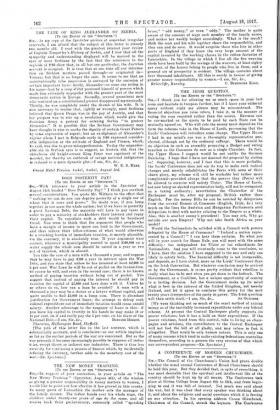THE NEW MONEY TRAINING.
[To IRE Ems. or sun " SPECTATOR."1 Sre,—In support of your contention, in your article on "The New Money Training " (Spectator, August 4th), of the wisdom of giving a greater responsibility in money matters to women, I
would like to t t cut how affective it has proved in this county. In many piths of Lancashire the mother acts the manager of the family income. The father hands over his whole wage, the eliildrea under twenty-ene years of age do the same, and all receive back the', pocket-money, commonly called " spending brass," " odd money," or even " eddy." The mother is quite aware of the amount of wage each member of the family earns, and makes her weekly budget accordingly. What is the result? Both the man and his wife together share the responsibility, and they can and do save. It would surprise those who live in other parts of England if they knew the very large amount of the capital invested by the working classes in the cotton factories of Lancashire. In the village in which I live all the five weaving sheds have been built by the savings of the weavers, at least eighty per cent. of the houses belong to people who live in them, and a general air of prosperity is evident. The village contains about four thousand inhabitants. All this is surely in favour of giving greater money responsibility to women.—I am, Sir, Ac.,


























 Previous page
Previous page